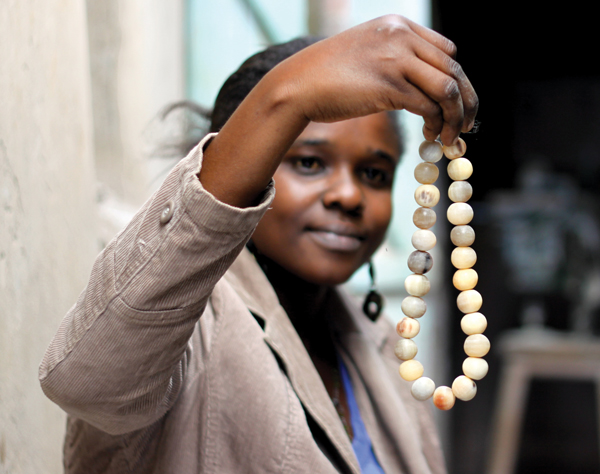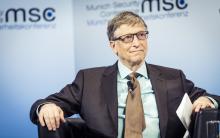Generation gap: why Millennials have hooked on to impact investing

Impact investing isn't only for the softhearted. In the past year alone, BlackRock launched new business unit BlackRock Impact, Goldman Sachs bought impact advisory firm Imprint, and former Massachusetts governor Deval Patrick now heads up Bain & Capital's impact fund. “Some of the most celebrated and followed world-class investors have jumped into impact investing in the last year,” says Jean Case, AOL Inc entrepreneur and CEO at the Case Foundation.
Hedge funder Bill Ackman put $5.8 million into Bridge International Academies earlier this year – a chain of affordable early education schools in Kenya and Uganda, which cost just $6 a child each month. Entrepreneur and investor Marc Andreessen, who previously said he would run screaming from a B-corp (a certified social enterprise), recently invested in AltSchool. “If you talk to some of these investors they will tell you there was some young person somewhere who was saying, 'here, you've gotta take a look at this',” reckons Case. A regular guest lecturer at business schools, Case says you cannot talk to Millennials about their careers without talking about impact – even if they're considering traditional finance.
 Rather than hindering momentum, British investor Sir Ronald Cohen (pictured right) says the global financial crisis has facilitated the impact investing movement (a term that is believed to have been coined at a Rockefeller Foundation meeting in 2007). He says the crisis shone a spotlight on unbridled financial ambition, increases in inequality, and the world becoming a lot less stable. Cohen has already been at the forefront of a once nascent investing movement – venture capital. Now he is described as the “father of social investment”, and was the chairman of the G8 social impact investment task force, launched in 2013. “In both cases a new generation was interested in bringing about change,” Cohen says. “In venture capital, it was tech entrepreneurs. In the case of impact investing, the Millennial generation wants to bring meaning to their lives and to their work, and has accepted responsibility to improve the lives of others.”
Rather than hindering momentum, British investor Sir Ronald Cohen (pictured right) says the global financial crisis has facilitated the impact investing movement (a term that is believed to have been coined at a Rockefeller Foundation meeting in 2007). He says the crisis shone a spotlight on unbridled financial ambition, increases in inequality, and the world becoming a lot less stable. Cohen has already been at the forefront of a once nascent investing movement – venture capital. Now he is described as the “father of social investment”, and was the chairman of the G8 social impact investment task force, launched in 2013. “In both cases a new generation was interested in bringing about change,” Cohen says. “In venture capital, it was tech entrepreneurs. In the case of impact investing, the Millennial generation wants to bring meaning to their lives and to their work, and has accepted responsibility to improve the lives of others.”
Certainly, there is a generational difference in attitudes to socially responsible investing. Research from US Trust found 69% of Millennials considered investments a way to express their social, political, and environmental values, almost double their Baby Boomer parents (36%), not to mention their Great Generation grandparents (31%). The cohort also outranked other generations when it came to accepting higher risks or lower returns in return for positive impact from their investments.
But not everyone is on board. Investor Warren Buffett, 85, believes it is too tough “to serve two masters”. The octogenarian, who co-founded The Giving Pledge, would rather maximise returns from his investments to give on a grander scale. A benchmark study, released by the Global Impact Investing Network (GIIN) and Cambridge Associates this year, found the average internal rate of return (IIR) for impact investment funds was 6.9%, versus 8.1% for non-impact counterparts, but performance varied across funds. Emerging market impact investment funds that raised capital between 1998 and 2004, for example, saw IRR of 15.5% compared to their non-impact counterparts that saw 7.6%.
 The size of the market is difficult to determine, 146 impact investors surveyed in the GIIN/J P Morgan report Eyes on the Horizon had impact AUM of $60 billion – up 7% from the previous year. With the next generation set to inherit $59 trillion over the next five decades, what does this mean for the future of business? “Our parents' and grandparents' generation thought little of allocating capital to rainforest destruction and coal mining and these things,” says UK investor Ben Goldsmith, 35 (pictured left). “As those old irresponsible investors die off and young, more responsible, more environmentally-conscious investors become those that are writing the cheques, I think we'll see it becoming harder and harder for the world's bad guys to get access to capital.” In July, he launched green fund, Menhaden Capital, one of 15 businesses currently listed on the new UK Social Stock Exchange.
The size of the market is difficult to determine, 146 impact investors surveyed in the GIIN/J P Morgan report Eyes on the Horizon had impact AUM of $60 billion – up 7% from the previous year. With the next generation set to inherit $59 trillion over the next five decades, what does this mean for the future of business? “Our parents' and grandparents' generation thought little of allocating capital to rainforest destruction and coal mining and these things,” says UK investor Ben Goldsmith, 35 (pictured left). “As those old irresponsible investors die off and young, more responsible, more environmentally-conscious investors become those that are writing the cheques, I think we'll see it becoming harder and harder for the world's bad guys to get access to capital.” In July, he launched green fund, Menhaden Capital, one of 15 businesses currently listed on the new UK Social Stock Exchange.
So what is impact? “A lot of corporates have taken pride in the fact that they have created jobs in poorer areas,” says Cohen. “They didn't have an objective to create jobs, they didn't measure achievement of that objective. We would call that investment with impact. But impact investments involve setting social objectives or environmental objectives alongside financial objectives and measuring the achievements of both.” Take for instance Oikocredit, headquartered in the Netherlands, which provides loans and other investments to microfinance providers working in low and middle-income countries. It has reached 28 million beneficiaries world wide. The One Acre Fund, working in East Africa, helps small shareholder farmers increase their yields and overall profits. In 2015 it worked with 300,000 farmers, increasing each individual's annual profits $135 on average.
Thirteen per cent of impact investment capital in the last year came from family offices and HNW individuals, according to Eyes on the Horizon (a further 6% came from foundations). Aligning family values to investment decisions, decision-making autonomy, and overall volume of assets makes family offices well suited to impact investing, a how-to guide released by the World Economic Forum in 2014 said (see box out). At multi family office Ascent Private Capital Jonathan Firestein, managing director for private capital and impact investing, says: “We have found that conversations surrounding impact and impact investing are a fantastic way to connect closely with a client's passion.” Abbot Downing in the US says feedback from Millennial clients has been partly behind its push into the impact investing space.
 Not every impact investment is a success. A social impact bond (a pay-for-success contract between the public sector and an impact investor) aimed at reducing recidivism among young inmates at Rikers Island prison in New York did not provide financial return or impact for its investors – Goldman Sachs and Bloomberg Philanthropies. “We never want to encourage somebody to take a risk that their portfolio can't handle,” says Case (pictured right). “Impact investing is new, it does represent risk, we think there is a lot of risk-adjusted return that you can see in impact investing that's reasonable, but we're also aware, for instance, with the social impact bond that wasn't successful.”
Not every impact investment is a success. A social impact bond (a pay-for-success contract between the public sector and an impact investor) aimed at reducing recidivism among young inmates at Rikers Island prison in New York did not provide financial return or impact for its investors – Goldman Sachs and Bloomberg Philanthropies. “We never want to encourage somebody to take a risk that their portfolio can't handle,” says Case (pictured right). “Impact investing is new, it does represent risk, we think there is a lot of risk-adjusted return that you can see in impact investing that's reasonable, but we're also aware, for instance, with the social impact bond that wasn't successful.”
When it comes to single family offices, Hyatt Hotels next-gen Liesel Pritzker, 31, is committed to allocating all her portfolio to impact through her family office Blue Haven Initiative; and the Brenninkmeijer family office has a privately-owned investment manager, Anthos Asset Management, dedicated to impact, to name a few. Goldsmith says it was only recently that his family office addressed impact in their investments, despite history of environmental philanthropy, beginning with a reduction of negative impact. “That's got to be the starting point for any family interested in impact,” Goldsmith says. “It's all very well investing for positive impact, but it's not particularly useful if the rest of your portfolio is creating tremendous negative impacts.” Those impacts could range from carbon emissions to effluent to discarded plastic waste.
People are shifting their mindset to consider how their values are expressed in their financial decision making, according to Amit Bouri, CEO at the GIIN, such as purchasing fair-trade coffee or energy efficient cars. (There are five Millennials in the Case household, and they were among the first to question their parents about bottled water and leaving the lights on, Case says). “What is really powerful about impact investing is taking some of that similar spirit and orientation, but applying it to the bulk of people's assets, which are their investments,” says Bouri.
 When Stephanie Cordes (pictured with her parents, Marty and Ron), 25, returned from the annual social entrepreneurship retreat her family foundation hosts each year, she too started seeing the world differently. “It started putting things in perspective.” She had not long been working in what she thought was her dream job with magazine publisher Condé Nast. Selling advertising space to luxury brands, however, didn't feel so fulfilling after meeting with entrepreneurs tackling the world's biggest problems. Back at work, Cordes began to question the supply chain of the fashion that filled the magazines' pages, and whether the office coffee was fair trade. Three months later she joined the Cordes Foundation, which is commited to a 100% impact portfolio, full-time.
When Stephanie Cordes (pictured with her parents, Marty and Ron), 25, returned from the annual social entrepreneurship retreat her family foundation hosts each year, she too started seeing the world differently. “It started putting things in perspective.” She had not long been working in what she thought was her dream job with magazine publisher Condé Nast. Selling advertising space to luxury brands, however, didn't feel so fulfilling after meeting with entrepreneurs tackling the world's biggest problems. Back at work, Cordes began to question the supply chain of the fashion that filled the magazines' pages, and whether the office coffee was fair trade. Three months later she joined the Cordes Foundation, which is commited to a 100% impact portfolio, full-time.
Research by Barclays Wealth Management in the UK found risk-seeking women are most likely to show interest in impact investing. Head of behavioural finance Greg B Davies says new adopters, high income (more so than wealth), and age also played a role. He added that people who were reluctant to invest at all, instead sitting on cash, showed a slightly higher preference for impact investing. (Wealthy Millennials keep a staggering 52% in cash, according to UBS research). “If social good gives them the narrative they require to get out of cash and to invest, it could mean that impact investing has the effect of not just doing social good but actually helping people to overcome an emotional barrier to putting their finances on a better footing as well.”
 Cordes thought she would be leaving the fashion world behind when she resigned from her publishing job, but one of her favourite impact investments has been with jewellery company Soko, which works with developing economy artisans (pictured right). “I never thought I would have any interest in finance,” says Cordes. “Now when I'm looking at an investment if it has something to do with fashion it makes me more excited, even if it is an Excel spread sheet.” Her father Ron, who founded traditional finance company AssetMark, mentors her. “I tend to look at these investment opportunities in the same very traditional way that I've been trained to look at everything else,” he says. “And I would suggest that she, in all the work that she's doing, is so deeply involved in many of these issue areas.”
Cordes thought she would be leaving the fashion world behind when she resigned from her publishing job, but one of her favourite impact investments has been with jewellery company Soko, which works with developing economy artisans (pictured right). “I never thought I would have any interest in finance,” says Cordes. “Now when I'm looking at an investment if it has something to do with fashion it makes me more excited, even if it is an Excel spread sheet.” Her father Ron, who founded traditional finance company AssetMark, mentors her. “I tend to look at these investment opportunities in the same very traditional way that I've been trained to look at everything else,” he says. “And I would suggest that she, in all the work that she's doing, is so deeply involved in many of these issue areas.”
The bulk of impact assets under management are allocated to housing (27%), according to the Eyes on the Horizon report. Together, microfinance and financial services account for a further 27%, followed by green energy (10%). Lynn Zovighian, managing director at The Zovighian Partnership, says direct investing provides the most straightforward way for family offices to engage in impact investing. Her Lebanon-headquartered social enterprise provides an educational platform for next-gens seeking impact from their wealth. “The ability to audit and seek out the data yourself as an investor or potential investor is less challenging because you are directly dealing with the asset and you are not dealing with a mediator.”
 Indeed, 76% of family offices in the space use direct equity investing to make impact investments, according to a research report released by the Financial Times last year. More than half (55%) had invested in funds. The report added that 72% of family offices not involved in impact investing were concerned about how to measure and monitor performance. A thought piece published on the Rockefeller Foundation's website last year, said measurement systems are among the most important mechanisms needed for good impact investing, adding that the Global Impact Investing Rating System (GIIRS) and Impact Reporting and Investment Standards (IRIS) are leading the pack. Sustainable investment manager WHEB Group, where Ben Goldsmith is a co-founding partner, published its first impact report last year, and his new fund will do the same – one of the requirements to be listed on the Social Stock Exchange.
Indeed, 76% of family offices in the space use direct equity investing to make impact investments, according to a research report released by the Financial Times last year. More than half (55%) had invested in funds. The report added that 72% of family offices not involved in impact investing were concerned about how to measure and monitor performance. A thought piece published on the Rockefeller Foundation's website last year, said measurement systems are among the most important mechanisms needed for good impact investing, adding that the Global Impact Investing Rating System (GIIRS) and Impact Reporting and Investment Standards (IRIS) are leading the pack. Sustainable investment manager WHEB Group, where Ben Goldsmith is a co-founding partner, published its first impact report last year, and his new fund will do the same – one of the requirements to be listed on the Social Stock Exchange.
Family cohesion is a significant part of the social impact offering at Trusted Family. Karl Malmström, head of advisory at the online network and education service for UHNW families, says investing money for good can address next gens' guilt about wealth they may not have created. Wealth management starts with a discussion about family values at US wealth manager Abbot Downing. “It's so powerful for grandparents to see how many of the values they hold dear have been passed on to their grandkids,” says Jill Shipley, head of family dynamics, adding that the resulting vision statements vary substantially across families, covering faith, health, ambition, and adventure – to name a few.
Carol Schleif, investment officer at Abbot Downing, says their families discuss where on the spectrum their portfolio will sit. “They will debate whether they invest the portfolio strictly in line with their social goals and risk underperforming, or do they invest the portfolio according to non-values based traditional portfolio management techniques, so that the income from the portfolio can grow and they can give more away each year.”
Next-gen engagement is a further benefit for families introducing impact investments to their portfolios. Cordes says she used to view work as a nine-to-five gig, but she now schedules meetings late into the evening. “Everything that I'm working towards and doing is part of something that I'm passionate about, so it doesn't feel as much like work.” Since joining the family foundation almost two years ago, Stephanie Cordes has spoken at the World Economic Forum and the Nexus Youth Summit. She recently started a six-month impact investing course at Harvard Business School. “In addition to the fact that we love her dearly as a daughter, we have gained an enormous amount of respect for her as a business partner due to the level of effort and initiative that she's put in,” says her father, Ron.
 Ross Baird (pictured right), a Millennial who co-founded social enterprise Village Capital, adds: “Focusing on having your entire life be sustainable, productive, and regenerative rather than this idea that you take for a long time and then you give back; the former is a world I'd much rather live in.” As an undergraduate, Baird had anticipated a career in non-profits, but today he leads his investment firm, which trains and funds social entrepreneurs, working with the likes of the Case Foundation.
Ross Baird (pictured right), a Millennial who co-founded social enterprise Village Capital, adds: “Focusing on having your entire life be sustainable, productive, and regenerative rather than this idea that you take for a long time and then you give back; the former is a world I'd much rather live in.” As an undergraduate, Baird had anticipated a career in non-profits, but today he leads his investment firm, which trains and funds social entrepreneurs, working with the likes of the Case Foundation.
Tightly defined roles for government, civil society, and business are dissolving, states the G8 subject paper for profit-with-purpose businesses. Charities are becoming more business-like, and business is looking to do good. Cohen, who remains on the board at UK social finance institution Big Society Capital, which he co-founded, adds: “Venture capital turned out to be appropriate for small businesses that want to be big. And I think similarly here, impact investment is going to apply for not-for-profits that want to be big.”
This un-siloed approach means impact investing is a strategy, not an asset class. “You cannot just allocate a portion of your portfolio to impact, the entire way of thinking about your portfolio needs to be driven by parameters and premises for good,” Zovighian says. She concedes that at this stage in the industry's development that is easier said than done, adding that in the Middle East most impact investors seek opportunities offshore due to a lack of opportunities at home.
Despite this, the G8 task force found many investors are choosing to treat impact as an asset class while the movement is still nascent. Cohen adds that this approach is valid too for next-generation family members who find their family office is not as evangelical about impact investing as they are. “They should push for an allocation that they are responsible for to invest in social impact bonds and social venture funds, or environmental impact bonds, and environmental venture funds,” Cohen suggests.
Certainly, those who have been in the game a while say they welcome a dose of scepticism. “You need the sceptics to be taking things apart and putting them back together again and perhaps looking at them from different perspectives. That's what will ultimately make this market stronger,” says Ron Cordes, who admits he used to think that returns had to be sacrificed in order to invest with impact.
As an entrepreneur, Case reckons the development of impact investing has had particular resonance with her and her husband. “I think all along we were drawn to this area because of our own personal background,” Case says, adding that when they were building up AOL, many people dismissed their vision. “So as we came across young entrepreneurs who had ideas to transform education or energy or healthcare or transportation, we didn't want to say good luck with that. We saw hope and promise because we have lived that.”






